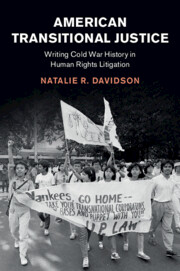Book contents
- American Transitional Justice
- Human Rights in History
- American Transitional Justice
- Copyright page
- Contents
- Figures
- Acknowledgments
- 1 Introduction
- 2 Alien Tort Statute Litigation in Legal Practice and the Legal Imagination
- 3 “Foreign Torture, American Justice”
- 4 Filártiga in Paraguay
- 5 Narrating the Marcos Regime in US Courts
- 6 The Marcos Case and Transitional Justice in the Philippines
- 7 Conclusion
- Book part
- Bibliography
- Index
6 - The Marcos Case and Transitional Justice in the Philippines
Published online by Cambridge University Press: 04 June 2020
- American Transitional Justice
- Human Rights in History
- American Transitional Justice
- Copyright page
- Contents
- Figures
- Acknowledgments
- 1 Introduction
- 2 Alien Tort Statute Litigation in Legal Practice and the Legal Imagination
- 3 “Foreign Torture, American Justice”
- 4 Filártiga in Paraguay
- 5 Narrating the Marcos Regime in US Courts
- 6 The Marcos Case and Transitional Justice in the Philippines
- 7 Conclusion
- Book part
- Bibliography
- Index
Summary
This chapter explores how the US court judgments and narratives in the Marcos case were mobilized in the Philippines. In the decade following the judgment on liability, victim organizations, elected officials, and the leftist press used the judgment to clarify the historical record and provide evidence of the extent of abuses under Marcos.In addition, when discussing the case, two leading Philippine newspapers offered a narrative about the Marcos regime much more challenging to both the US and to Filipino elites than that offered in US courts. The chapter also explores post-liability proceedings, and their conflict with the Philippine Republic’s policy of agrarian reform in the post-Marcos era. This conflict was resolved in 2013 through the enactment of a law providing reparations and recognition to victims of the Martial Law regime. Though the reparations law was initially conceived as a way to enforce the ATS judgment and was accordingly limited to narrow categories of abuse, following parliamentary debates its scope was extended to cover a broader range of victims whose stories are being recorded for the first time. In addition, the reparations legislation has triggered and strengthened various governmental and nongovernmental memory and official history projects. The chapter thus traces how in the move from the United States to the Philippines the meaning of the lawsuit was transformed to produce richer public narratives of repression under Marcos.
- Type
- Chapter
- Information
- American Transitional JusticeWriting Cold War History in Human Rights Litigation, pp. 144 - 179Publisher: Cambridge University PressPrint publication year: 2020

